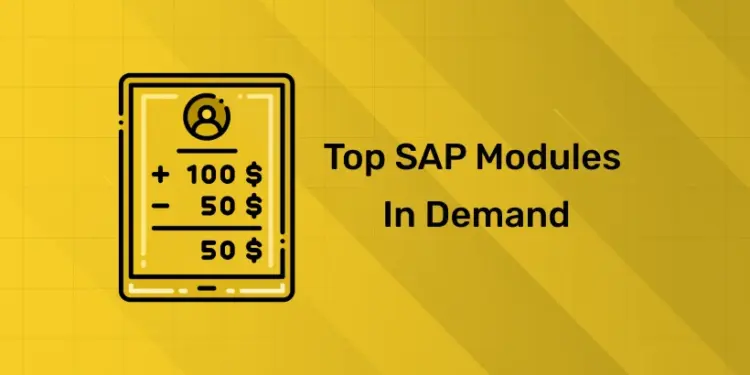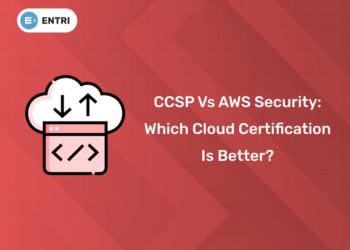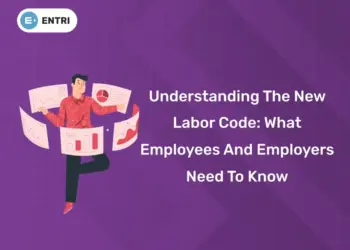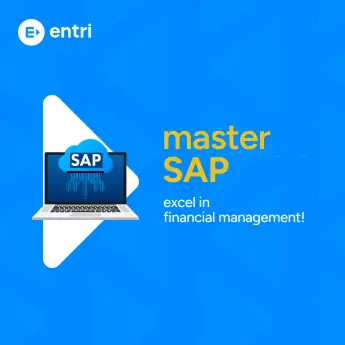Table of Contents
Whether you’re a seasoned SAP professional navigating through the intricacies of the digital landscape or an aspiring enthusiast eager to carve a niche in this thriving domain, understanding the pulse of the most in-demand SAP modules is paramount. Welcome aboard as we embark on an exciting journey into the realm of SAP modules in 2026! In today’s dynamic business environment, SAP solutions have become indispensable for organizations seeking to stay competitive and agile.
Top SAP Modules in Demand:
- SAP S/4HANA
- SAP SuccessFactors
- SAP Ariba
- SAP Customer Experience (CX)
- SAP FICO (Financial Accounting and Controlling)
- SAP MM (Materials Management)
- SAP SD (Sales and Distribution)
In this comprehensive guide, we’ll navigate through the intricacies of the top SAP modules, with a special spotlight on the perennial favourite, SAP FICO. Additionally, we’ll unravel the essential skills and backgrounds required to excel in these roles, shedding light on the departments where these modules wield the most influence and are eagerly sought after. So, fasten your seatbelts as we embark on this enlightening journey into the heart of SAP expertise in 2026.
Enhance your SAP MM expertise! Enroll today!
Top SAP Modules in Demand: Overview
Each of these SAP modules plays a pivotal role in different aspects of organizational operations and strategy. Let’s delve into each module’s significance and how it contributes to organizational success:
SAP S/4HANA:
SAP S/4HANA stands at the forefront of digital transformation initiatives for businesses. With its real-time analytics capabilities, streamlined processes, and user-friendly interface, S/4HANA empowers organizations to embrace innovation and maintain a competitive edge in today’s fast-paced market. By leveraging S/4HANA, businesses can gain deeper insights into their operations, optimize processes, and make data-driven decisions that drive growth and profitability.
SAP SuccessFactors:
In the modern talent-driven economy, organizations recognize that their people are their most valuable asset. SAP SuccessFactors addresses the critical need for effective human capital management by offering a comprehensive suite of HR solutions. From recruitment and onboarding to performance management and learning and development, SuccessFactors enables businesses to attract, develop, and retain top talent. By nurturing their workforce, organizations can enhance employee engagement, productivity, and ultimately, drive organizational success.
SAP Ariba:
Procurement plays a central role in driving efficiency and cost optimization within organizations. SAP Ariba provides a cloud-based procurement platform that connects buyers and suppliers, facilitating seamless collaboration and transactional processes. By leveraging Ariba, businesses can streamline their end-to-end procurement process, improve supplier relationships, and drive cost savings. With features such as e-procurement, contract management, and supplier performance tracking, Ariba empowers organizations to make smarter procurement decisions and achieve their strategic objectives.
SAP Customer Experience (CX):
In an era where customer expectations are higher than ever, delivering exceptional customer experiences is paramount for businesses. SAP CX solutions encompass a range of tools and technologies designed to help businesses deliver personalized and seamless experiences across every touchpoint of the customer journey. From marketing and sales to service and commerce, SAP CX enables businesses to engage with customers in meaningful ways, build brand loyalty, and drive revenue growth.
SAP FICO (Financial Accounting and Controlling):
Financial management is the backbone of every organization, and SAP FICO serves as a cornerstone module for finance departments. FICO offers robust capabilities for financial accounting, reporting, and controlling, allowing organizations to maintain accurate financial records, comply with regulatory requirements, and make informed business decisions. By integrating with other SAP modules, FICO provides comprehensive financial insights that enable the organization.
SAP MM (Materials Management):
SAP MM is a key SAP ERP module that manages procurement, inventory, and material flow efficiently. Features include automating purchase orders, vendor management, and stock tracking while integrating with modules like SD and PP. This results in streamlining supply chains, reducing costs, and ensuring accurate inventory for industries like manufacturing, retail, and logistics.
SAP SD (Sales and Distribution):
SAP SD is another core module that manages the sales cycle, which starts from order through delivery and ends in billing. It provides features such as streamlining sales order processing, pricing, shipping, and invoicing. Additionally, it can also integrate with modules like MM and PP to optimize order-to-cash processes and boost customer satisfaction for companies in manufacturing, retail, and distribution.
Explore free materials on various SAP modules for you to kickstart your career!
SAP Modules: Skills and Background Required
To excel in these highly sought-after SAP modules, professionals must possess a diverse skill set tailored to each module’s unique requirements. Let’s delve deeper into the key skills and backgrounds needed for proficiency in each module:
-
SAP S/4HANA:
- Technical Expertise: A strong understanding of the SAP HANA database is crucial for leveraging the full potential of S/4HANA. Professionals should be adept at working with data models, SQL queries, and database administration tasks.
- Project Experience: Hands-on experience with SAP implementation projects is invaluable. Professionals should be familiar with project management methodologies, change management processes, and best practices for system integration and customization.
- Domain Knowledge: Knowledge of finance and supply chain management processes is essential for effectively implementing and optimizing S/4HANA solutions. Professionals should understand industry-specific requirements and be able to align SAP functionalities with business objectives.
-
SAP SuccessFactors:
- HR Expertise: A deep understanding of HR processes and regulations is fundamental for success in this module. Professionals should be familiar with recruitment, onboarding, performance management, learning and development, and other HR functions.
- Cloud Technology: Experience with cloud-based HR solutions is essential, as SuccessFactors is a cloud-based platform. Professionals should be comfortable working with software-as-a-service (SaaS) solutions and leveraging cloud infrastructure for scalability and flexibility.
- Communication Skills: Excellent communication and interpersonal skills are critical for interacting with stakeholders, understanding their requirements, and effectively implementing SuccessFactors solutions to meet their needs.
-
SAP Ariba:
- Procurement Expertise: Proficiency in procurement processes is key for success in the Ariba module. Professionals should understand sourcing, procurement, contract management, supplier relationship management, and other procurement functions.
- Supply Chain Knowledge: A solid understanding of supply chain management is essential, as Ariba solutions are closely integrated with supply chain processes. Professionals should be familiar with inventory management, demand planning, logistics, and other supply chain functions.
- Negotiation Skills: Negotiation skills are crucial for managing supplier relationships, securing favourable terms and prices, and optimizing procurement outcomes. Professionals should be able to negotiate contracts, resolve disputes, and drive cost savings through effective negotiations.
-
SAP Customer Experience (CX):
- Customer Experience Principles: An understanding of customer experience principles is fundamental for success in the CX module. Professionals should be familiar with customer journey mapping, persona development, customer segmentation, and other CX concepts.
- Sales and Marketing Knowledge: Familiarity with marketing and sales processes is essential, as CX solutions aim to enhance customer engagement and drive sales. Professionals should understand lead generation, campaign management, sales pipeline management, and other sales and marketing functions.
- Technical Proficiency: Proficiency in SAP CX solutions such as SAP Marketing Cloud and SAP Sales Cloud is necessary for implementing and configuring CX solutions to meet business requirements.
-
SAP FICO:
- Financial Accounting Principles: An in-depth knowledge of financial accounting principles is essential for success in the FICO module. Professionals should understand financial reporting standards, accounting principles, and financial analysis techniques.
- SAP ERP Experience: Experience with SAP ERP systems is crucial, as FICO is an integral part of the SAP ERP suite. Professionals should be familiar with SAP modules such as General Ledger (GL), Accounts Payable (AP), Accounts Receivable (AR), Asset Accounting (AA), and Controlling (CO).
- Attention to Detail: Attention to detail is critical for accurate financial reporting and analysis. Professionals should have a meticulous approach to data entry, reconciliation, and financial documentation to ensure compliance and accuracy.
-
SAP MM:
-
Understanding of supply chain management principles and integration with related SAP modules (e.g., SD, PP).
-
Basic technical proficiency in SAP ERP system navigation, configuration, and data analysis related to materials management.
-
Knowledge of procurement and inventory processes, including purchase order management and vendor relations.
-
-
SAP SD:
-
Strong analytical and communication skills to manage customer requirements and streamline order-to-cash workflows.
-
Experience with sales cycle operations such as sales order processing, pricing, and invoicing within ERP systems.
-
Ability to coordinate sales, distribution, and logistics while working with modules like MM and PP.
-
Master SAP with Expert-Led Courses
Unlock your potential with our comprehensive SAP courses! Learn essential modules like SAP MM (Materials Management), SAP SD (Sales and Distribution), and SAP FICO (Financial Accounting and Controlling) from industry experts.
Know MoreSAP Modules: Departments
Each SAP module serves a specific function within organizations, and they are typically required in the following departments. The SAP module plays a distinct role within organizations, catering to specific functions and departments. Here’s a closer look at where each module is typically required:
SAP S/4HANA:
This module finds its primary applications in IT departments, where professionals leverage its capabilities for managing and optimizing business processes. Moreover, S/4HANA is indispensable for finance departments, enabling them to streamline financial operations, automate processes, and gain real-time insights. Additionally, it’s extensively utilized in supply chain management to enhance efficiency, visibility, and responsiveness across the supply chain network.
SAP SuccessFactors:
Human resources departments heavily rely on SAP SuccessFactors for managing various aspects of talent management, including recruitment, performance management, learning and development, and employee engagement. The module helps HR professionals attract, retain, and develop top talent by providing a comprehensive suite of cloud-based HR solutions tailored to meet their evolving needs.
SAP Ariba:
Procurement and supply chain management departments leverage SAP Ariba to streamline procurement processes, manage supplier relationships, and drive cost savings. The module offers a cloud-based procurement platform that enables organizations to digitize and automate their procurement processes, from sourcing and contracting to invoicing and payment.
SAP Customer Experience (CX):
Marketing, sales, and customer service departments rely on SAP CX solutions to deliver exceptional customer experiences across all touchpoints. SAP CX enables organizations to personalize marketing campaigns, optimize sales processes, and deliver responsive customer service, ultimately driving customer satisfaction and loyalty.
SAP FICO:
Finance, accounting, and controlling departments heavily depend on SAP FICO for managing financial accounting, reporting, and controlling functions. The module provides robust capabilities for financial planning, budgeting, asset management, and cost accounting, empowering organizations to make informed financial decisions and ensure compliance with regulatory requirements.
SAP MM:
SAP MM is typically required in departments such as procurement, inventory management, warehouse management, supply chain, and production planning. These departments depend on the module to handle purchasing activities, vendor management, inventory tracking, and stock valuation, ensuring efficient material flow and cost control throughout the organization.
SAP SD:
Departments such as sales, customer service, distribution, billing, and logistics make use of this module to manage the entire sales process – handling sales orders, pricing, shipping, invoicing, and delivery – which streamlines order-to-cash cycles and enhances overall customer satisfaction and business performance.
Get trained in SAP SD expertise! Enroll to get a demo class!
SAP Modules: Common Mistakes
Avoiding common mistakes in your SAP career journey is essential for long-term success and growth. Let’s explore these mistakes in more detail and discuss how to steer clear of them:
Neglecting Continuous Learning:
The world of SAP is dynamic, with new technologies and updates released regularly. Neglecting continuous learning can quickly lead to outdated skills and knowledge. To avoid this, make learning a priority throughout your career. Invest in training courses, attend workshops and webinars, and pursue SAP certifications to stay abreast of the latest trends and developments. Additionally, joining SAP user groups and online communities can provide valuable insights and opportunities for learning from peers.
Focusing Solely on Technical Skills:
While technical expertise is undoubtedly important in SAP roles, soft skills are equally crucial for success. Effective communication, problem-solving, and teamwork skills are essential for collaborating with colleagues, understanding client requirements, and delivering successful SAP projects. To avoid this mistake, focus on developing a well-rounded skill set that encompasses both technical and interpersonal skills. Seek opportunities to enhance your communication abilities, problem-solving techniques, and collaboration skills through workshops, training programs, and real-world experiences.
Overlooking Industry-Specific Knowledge:
SAP modules often cater to specific industries, each with its unique processes, regulations, and challenges. Ignoring industry-specific knowledge can hinder your ability to understand client needs and deliver tailored solutions effectively. To avoid this mistake, take the time to familiarize yourself with the industry verticals you’re interested in or currently working within. Stay updated on industry trends, regulations, and best practices through industry publications, conferences, and networking events. Developing industry-specific expertise will not only enhance your value as a SAP professional but also make you more attractive to potential employers.
Underestimating the Importance of Networking:
Networking is a powerful tool for career growth and advancement in the SAP ecosystem. Yet, many professionals underestimate its significance and fail to invest time and effort in building meaningful connections. To avoid this mistake, actively participate in SAP events, conferences, and user group meetings to expand your professional network. Join online forums, LinkedIn groups, and SAP community platforms to connect with like-minded professionals, share knowledge, and stay updated on industry trends. Cultivating a strong network of contacts can provide invaluable support, mentorship, and career opportunities throughout your SAP journey.
Conclusion
In conclusion, the demand for skilled SAP professionals is on the rise, and specializing in top modules such as SAP S/4HANA, SuccessFactors, Ariba, CX, FICO, MM, and SD can significantly enhance your career prospects. By acquiring the necessary skills, gaining relevant experience, and avoiding common mistakes, you can position yourself as a valuable asset in the dynamic world of SAP. So, take the plunge, embrace the challenge, and embark on your journey to SAP success today!
Entri is one of the leading platforms that provides courses on SAP modules such as FICO, MM, and SD. With industry experts as mentors, practical training, and a dedicated placement cell, your first step into the SAP career is closer. So, take the plunge, embrace the challenge, and embark on your journey to SAP success today!
Enhance your SAP FICO expertise! Enroll today to elevate your skill set!
Master SAP with Expert-Led Courses
Unlock your potential with our comprehensive SAP courses! Learn essential modules like SAP MM (Materials Management), SAP SD (Sales and Distribution), and SAP FICO (Financial Accounting and Controlling) from industry experts.
Know MoreFrequently Asked Questions
What are SAP modules?
SAP modules are software solutions developed by SAP SE, a German multinational software corporation, to address specific business functions within organizations.
How many SAP modules are there?
SAP offers a wide range of modules covering various business functions such as finance, human resources, procurement, sales, and more. While the exact number of modules may vary, there are over 25 core modules provided by SAP.
What is SAP S/4HANA?
SAP S/4HANA is an enterprise resource planning (ERP) suite that serves as the digital core of an organization. It provides real-time analytics, streamlined processes, and a simplified user experience to help businesses drive innovation and stay competitive.
What is SAP SuccessFactors?
SAP SuccessFactors is a cloud-based human capital management (HCM) suite that helps organizations manage their HR processes, including talent acquisition, onboarding, performance management, learning, and development.
What is SAP Ariba?
SAP Ariba is a cloud-based procurement platform that connects buyers and suppliers, enabling organizations to manage their end-to-end procurement process efficiently, from sourcing and contracting to procurement and payment.
What is SAP Customer Experience (CX)?
SAP Customer Experience (CX) is a suite of solutions that help businesses deliver personalized and seamless customer experiences across marketing, sales, service, and commerce channels.
What is SAP FICO?
SAP FICO (Financial Accounting and Controlling) is a core module that provides comprehensive financial accounting and controlling capabilities, including general ledger, accounts payable, accounts receivable, asset accounting, cost center accounting, and more.
What skills are required for SAP modules?
The skills required for SAP modules vary depending on the specific module and role. However, common skills include technical proficiency, domain knowledge, analytical thinking, problem-solving, communication, and project management skills.
What background is needed for SAP modules?
Background requirements for SAP modules also vary, but a degree in computer science, information technology, engineering, business administration, or a related field is often beneficial. Additionally, relevant work experience and certifications in SAP modules can enhance your qualifications.
Which departments use SAP modules?
SAP modules are utilized across various departments within organizations, including IT, finance, human resources, procurement, sales, marketing, and customer service.













